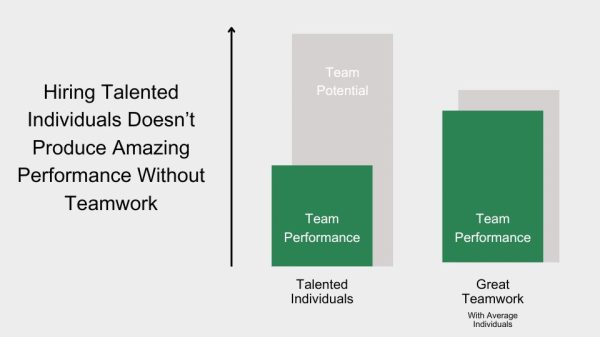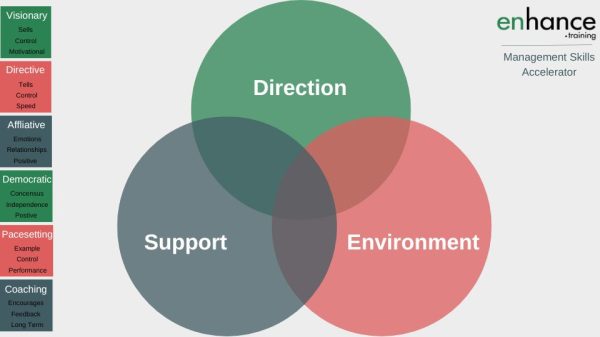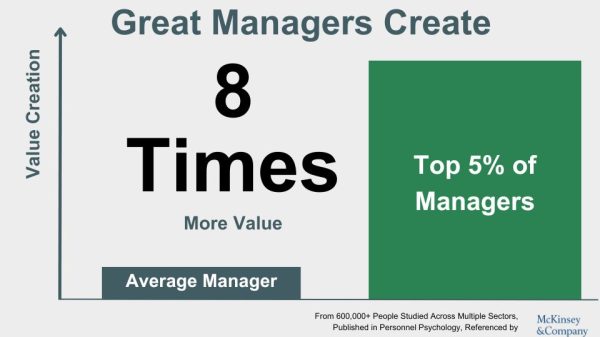What to Do Differently to Build High Performing Teams At Work

High performing teams are built not recruited. Talented people on the team increases the team’s potential. Hiring great individuals, on their own, doesn’t increase the overall team’s performance significantly. High performing teams produce amazing results because of how they operate, how team members work together, how they communicate and collaborate and how they support and help each other.
High performing team members all know that they are better off when the team as a whole is better off. In too many company cultures, the competition between individuals to get ahead, to get that next promotion, prevents true teams forming.
What to Do Differently to Build High Performing Teams At Work
- 8 characteristics of what makes high performing teams
- 6 things high performing teams do differently
- 4 things the manager needs to do differently to build amazing teams
Even more importantly, leaders and managers haven’t been taught what they need to do to overcome this and other hurdles to building high performing teams. To help change that we are going through what to do differently to build high performing teams at work.
We have been working in groups for centuries. Working together has been key to human success. Leaders and managers should work on the environment and demonstrate the practices they want to instil in their teams. Team members know how to work together and will do so when you create the right incentives, building great team performance.
Watch on YouTube
Listen on Podcast
Before we dive into what managers should do differently to build high performing teams at work, lets cover
What makes high performing teams and why we should care
There are many characteristics of high performing teams including the following:
In high performing teams, the team and everyone in the team are very clear about their responsibilities and the goals they need to reach, individually and collectively.
Team members understand how their work fits into the department and organisation’s purpose. They know why their work is valuable to the larger group.
High performing teams have clear roles which are communicated throughout the team, so everyone understands what they and everyone else are doing to achieve the team’s goals.
There is a lot of trust between team members of high performing teams – both on a professional level and at a personal level. Team members have each other’s back.
High performing teams have a lot of open honest communication. There is always the hum of voices discussing solutions, providing help, opinions, challenge, and feedback. The communication is honest, direct, and diplomatic. Everyone know what is happening and where they stand.
Feedback is essential to improve. High performing teams are constantly providing feedback. Feedback goes in all directions, up, down and sideways. Honest considered feedback is encouraged and listened to.
High performing teams demonstrate a collective desire to learn and get better. Team members are expected to learn, encouraged, and helped by colleagues as much as their leaders.
High performing teams are laser focused on delivering results. Progress is tracked and communicated constantly. Team members know what they personally need to do to help the team deliver as a whole. There is a lot of visibility and collaboration in amazing teams.

Why we should Care About Team Performance
Why should we care about creating high performing teams. The business environment is ultra-competitive. The people employed are the business. People make the decisions. People create the value. High performing teams create a lot more value for little extra cost. The performance difference is not just 10% or 20% more – it is many times more.
I personally have seen and created these huge differences multiple times in different companies with different teams. Most managers should be able to build high performing teams when they know how to do it and build skills and confidence to make the changes needed. Knowing what to do is a critical starting point.
We have covered many characteristics of high performing teams. I am going to quickly touch on
what high performing teams do differently from most other teams
These 6 approaches are part of what high performing teams at work do differently.
1 – Communication and collaboration are everywhere
In high performing teams, you see team members constantly at each other’s desks, chatting, discussing, and even arguing. There is energy in the air, a desire to overcome problems together and enjoyment in collaborating and being successful together. Communication and collaboration are the lifeblood of high performing teams.
2 – The team celebrates the differences
Using team members differences – their difference opinions, viewpoints, experience, knowledge and skills is what makes high performing teams. The team maximises everyone’s strengths as much as possible and uses diversity to create stronger better solutions to the business problems they face.

3 – Team members create genuine authentic relationships
High performing teams are built on relationships. Team members get to know and understand the character, interests, ambitions and preferences of their colleagues. They look for and find the positives, the connections and build genuine authentic relationships. Team members enjoy working alongside their colleagues.
4 – Mutual accountability is the norm
Accountability is big factor in amazing teams. No-one wants to let their colleagues down. Each team member will do their best to deliver what is expected and needed from them. Equally asking for help early is encouraged and praised. Help asked for is given quickly. The team succeeds or fails together.

5 – Decision making happens at all levels
Each team member understands what level and type of decisions they are expected to make and which they should refer to their seniors or manager. Everyone works quicker and with more psychological safety that teams that refer most decisions to their manager.
6 – Praise and recognition are everyday practices
Praising great actions, decision and results happens everyday in high performing teams. It is all the little comments sharing appreciation that really count. Praise given is specific, considered, and heartfelt. Team members openly and actively recognise all the contributions made by others to create great results.
These are all habits of high performing teams. There is a lot you as a manager can do to build amazing teams.
Building a high performing team – what the manager needs to do differently
1 – Be with the team, not above the team
Social and group status are important to most in any collection of people. It takes a lot of hard work to be promoted into a management position and you should be proud of your achievement. It can be very easy and tempting to reinforce your management status to your team, through your actions, decisions, and behaviours.
Great managers do the opposite. They work to demonstrate they are part of the team, not above it. They work hard to serve the team, to help, support and share their knowledge and skills for the benefit of the team.
A key approach to building a high performing team as a manager, is to be with the team and not above the team. Without a team, there is no need for a manager. You create a lot more value through your team than as an individual. Your team is vitally important to you and your career. Demonstrate how much you value them every day.
2 – Everything you do needs to scream trust and that you will have your team’s back
Without trust you don’t really have a team, just a collection of individuals. To be a true team they must trust you and each other. Demonstrate you are trustworthy. Visibly protect your team. Help team members be better. Extend trust. Listen and act on team member’s good ideas. Don’t punish learning mistakes. Praise more than criticise. Get to know each team member. Treat each person as an individual. Make decisions in the team’s best interest, not yours. There are so many things you can do to scream “I am here for you”. Work hard to build trust.

3 – Clear, simple, repeated direction until everyone is bored
Every manager is told to provide direction, yet few managers go far enough. Great managers provide consistent and clear direction through what they say and also through their actions, decisions and behaviours. Great managers work hard to repeat and reinforce direction. They don’t stop talking about what is expected and what the team needs to do. They don’t stop asking team members for ideas on how to achieve team and individual goals.
High performing teams know exactly what is expected on multiple levels. This surety and confidence in where they are going provides psychological safety, permission to take risks, encourages decision making and taking independent but aligned action – all in service of helping the team reach their goals. Great managers never stop giving clear direction to their teams.
4 – Work hard to support, help and develop your team
Being a successful leader or manager is a careful and difficult balancing act. Management success requires authenticity and being yourself yet also conforming within the wider team. You are asked to lead, yet you also need to serve your team for success. To build high team performance you have to ask a lot from your team, yet you also have to give a lot back to create a fair deal for everyone.
Work hard to support your team with your skills, knowledge, and experience. Get involved and help them solve the problems they face. Actively share what you have learnt through teaching, mentoring and coaching team members. Give as much or more than you take.
In summary
Building high performing teams is clearly not easy. The rewards on a personal as well as a business level through increasing team performance are significant. The top managers create 8 times more value than average managers. This is a huge difference. Managers create value through their teams, so the team’s performance is the manager’s performance.
Use all the tips I have shared on what to do differently to build high performing teams at work. I have covered:
- 8 characteristics of what makes high performing teams
- 6 things high performing teams do differently
- 4 things the manager needs to do differently to build amazing teams
There are more approaches, behaviours and actions needed yet by implementing what we have covered today, you will be well on your way to building a higher performing team.
For more help to build high performing teams, take a look at our management skills accelerator course.
Building high performing teams can be achieved in months and with ordinary individuals with a skilled manager. Hiring superstars increases the potential of the team, but does not necessarily improve the performance.
High team performance comes from how the team works together and what they work on. High performance comes from building trust, having great communication, a clear direction and the right environment. The manager and leader has the most influence over all these aspects. Learn what is needed and practice this day in and day out and guarantee yourself an amazing career for life.
Jess






